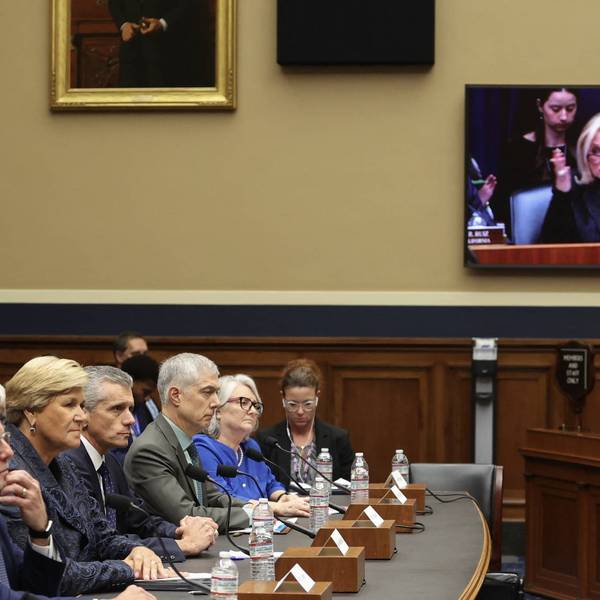Congresswoman Pramila Jayapal on Thursday night responded to a new analysis exposing the failures of the for-profit U.S. healthcare system by renewing her call for Medicare for All.
Jayapal (D-Wash.) and Sen. Bernie Sanders (I-Vt.) are the lead sponsors of the Medicare for All Act. When they reintroduced the bill last year, they highlighted research showing that it could save 68,000 lives and $650 billion per year.
The Commonwealth Fund report—titled Mirror, Mirror 2024: A Portrait of the Failing U.S. Health System and released Thursday—adds to the mountain of evidence that, as Jayapal said in a series of social media posts, "our healthcare is broken."
Noting that "41% of Americans hold medical debt" and "millions are uninsured," the Congressional Progressive Caucus chair declared that "we need universal, single-payer healthcare: Medicare for All."
"America's healthcare system is in dire need of an overhaul. It is largely run by private insurance companies who only care about increasing their profits and limiting choices for consumers."
As Common Dreams reported, the latest Commonwealth Fund analysis focuses on 70 health system performance measures in Australia, Canada, France, Germany, the Netherlands, New Zealand, Sweden, Switzerland, the United Kingdom, and the United States.
"All the countries have strengths and weaknesses, ranking high on some dimensions and lower on others," the report states. "Nevertheless, in the aggregate, the nine nations we examined are more alike than different with respect to their higher and lower performance in various domains. But there is one glaring exception—the U.S."
Jayapal made her case for Medicare for All with some details from the report, pointing out that "despite spending more, the U.S. ranked last in equity, access to care, and health outcomes—including acute illnesses, chronic diseases, and death. Of the countries studied, Americans live the shortest lives and face the most avoidable deaths."
"This is wholly unacceptable," she argued. "America's healthcare system is in dire need of an overhaul. It is largely run by private insurance companies who only care about increasing their profits and limiting choices for consumers."
"They refuse to pay for certain doctors, even as the average American spends tens of thousands of dollars every year on copays, deductibles, and private insurance premiums," she said. "Sometimes, they even have their own doctors override decisions about what you need for your own healthcare."
The congresswoman continued:
Medical debt and exorbitant costs regularly keep people from seeking necessary care, with a growing population of "underinsured" Americans—those who have health insurance but still aren't getting the care they desperately need.
This for-profit system leads to higher rates of death and disease and lower life expectancies—all while Americans spend more and more trying to get the care they need. In the richest nation on the planet, this simply should not and cannot be the case.
We need a system with comprehensive care for all, regardless of employment status, with no copays, deductibles, or private insurance premiums. A system where the [government] provides your insurance and doesn't allow private companies to override what your own doctor says you need.
We need comprehensive and improved Medicare for All that covers mental health, long-term care, reproductive care, dental, vision, and hearing. No hidden fees, no premiums, no copays, no deductibles. Just healthcare—when you need it, where you need it, so you can stay healthy.
"I'm so proud to be the lead sponsor of the Medicare for All Act, and I won't stop fighting until everyone can get quality healthcare without having to worry about what it might cost. Thank you so much to the 100+ members who have cosponsored our bill, H.R. 3421!" she added. "It's time for a healthcare system that actually works. Let's get Medicare for All done."
The bill, which has 14 co-sponsors in the Senate, has no chance of advancing in the current Congress and would likely face difficulty in the next one, even if Democrats won both chambers in the November election. Republican former President Donald Trump spent his first term attacking the U.S. healthcare system, while Democratic Vice President Kamala Harris has dropped her support for Medicare for All, saying recently that she wants to "maintain and grow the Affordable Care Act."
Still, patients, providers, and progressive lawmakers continue to demand a transition to a public system that serves all Americans—and Jayapal wasn't alone in pointing to the Commonwealth report as proof of the need for a major overhaul.
The other nine nations analyzed "have found [ways] to meet residents' basic healthcare needs, including universal coverage," University of California Health executive vice president Dr. Carrie L. Byington stressed on social media.
"The only clear outlier is the [United States], where health system performance is dramatically lower," Byington added. "Americans deserve better. #HealthcareForAll."




